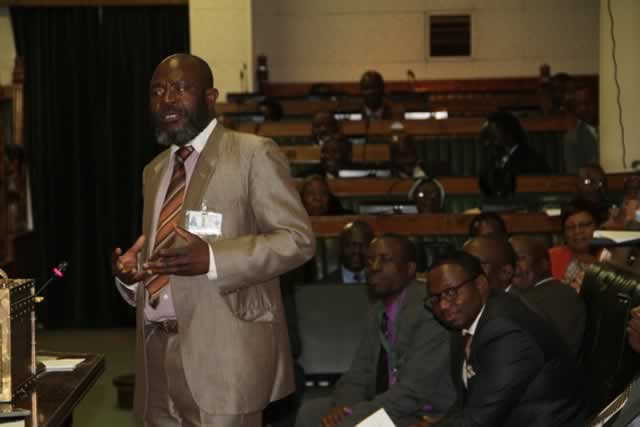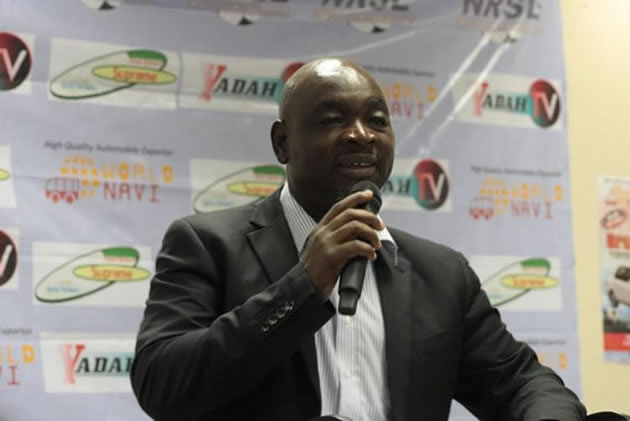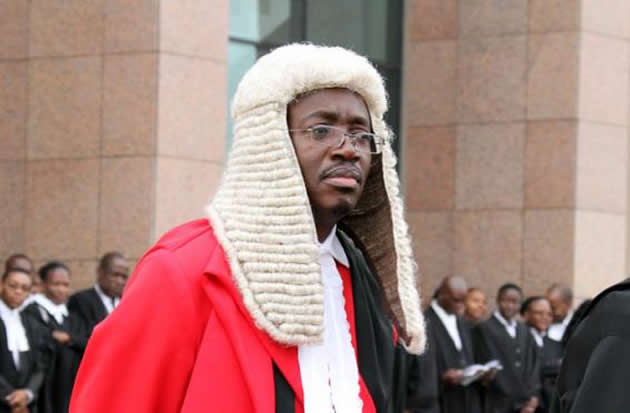Solving algebra in the mother tongue


Cde Chinotimba contributes to debate in the National Assembly. He is advocating the teaching of maths and science in indigenous languages
Stanely Mushava Correspondent
Buhera South legislator Cde Joseph Chinotimba stirred controversy last week when he proposed in Parliament that Mathematics be taught in indigenous languages for students to perform better. Proponents and critics of the idea exchanged fire on social media, with some digressing so far as to extract raw material for new jokes from the legislator’s unconventional remarks.
Others dared the maverick legislator to translate algorithms, trigonometry, convex geometry, quantum mechanics and other tongue-twisters and jaw-crashers to Shona before burdening anyone with such an ambition.
The critics fear that these sophistries are bound be lost in translation. In any case, they cannot process the idea of schools deigning that low. For them, English is the definition of cool, the height of sophistication. To be fair to Cde Chinotimba, his critics seem to miss the obvious. The multi-disciplinary facility of the English language is not entirely self-generated but liberally imported from influences as diverse as Celtic, Latin, Hindi, Greek, Scandinavian, Hebrew, French and Arabic.
There is no reason why Shona, Tonga or Kalanga should not embrace enriching influences, in addition to our indigenous knowledge systems, in the interest of education. First though, we revert to the context of Cde Chinotimba’s out-of-the-box proposal.
English is currently the medium of instruction across the disciplines from Early Childhood Development (ECD) to university, with only Shona and Ndebele being taught autonomously, while Tonga, Shangani, Sotho, Kalanga and Nambya are being “uploaded” onto the primary syllabus. Cde Chinotimba’s wager is that conducting lessons in these mother tongues will do away with the foreign atmosphere of the classroom and help students to understand better.
“My question is when are we going to respect our local languages such as Shona and Ndebele so that we are able to work mathematical problems either in Ndebele or in Shona?” Cde Chinotimba asked the Minister of Primary and Secondary Education Dr Lazarus Dokora in a Parliamentary session last week. He argued that students in countries such as China, Cuba and Yugoslavia take up university programmes across the disciplines in their own languages yet they are successfully exporting talent elsewhere.
“When are we ever going to reach that stage? Our people are failing examinations because they are using a foreign language. The Chinese come here speaking their own language yet they are building structures here and they are good at what they do,” Cde Chinotimba pointed out. And he is perfectly on point. The competency of the Eastern languages as repositories of knowledge, cultural and technological, is not in question.
In fact, Asian giants such as China, South Korea, Japan and India have been able to export their technological acumen and creative products far and wide, with only negligible traces of the English language, partly because they have the kind of self-esteem required for such exploits. Cde Chinotimba urged a changeover in Zimbabwe’s understanding of education: “When are we going to change our mindset so that our education is administered to our children in our own languages?” he asked.
Dr Lazarus Dokora validated the Buhera South legislator’s concerns and took the opportunity to inform Parliament that his ministry acknowledged the 16 languages recognised by the Constitution as the country’s official languages and was working to embrace them into the curriculum. More critically, the Minister announced a new policy whereby infants would be instructed across the disciplines in their own languages.
“We now have a position that has been agreed by the Cabinet Committee in terms of how four-year-olds up to Grade Two are to be instructed at school. They’ll be instructed in the languages that have been accepted in our Constitution. That’s the focus that we’re now going to take and those are the steps that we’re going to implement,” said Dr Dokora.
“As a Ministry, we’ve started the process by accepting the languages that are recognised by our Constitution so that they can now be used as official languages, but it’s not our duty alone to ensure that these languages are promoted.”
He said the issue of using local languages in schools was a process that involved other ministries such as that of Higher and Tertiary Education which has experts that look into language development so that languages can be further developed. Minister Dokora said his ministry had started the process by recognising the 16 languages recognised by the Constitution as the country’s official languages.
The Constitution of Zimbabwe recognises Chewa, Chibarwe, English, Kalanga, Khoisan, Nambya, Ndau, Ndebele, Shangani, Shona, sign language, Sotho, Tonga, Tswana, Venda and Xhosa as Zimbabwe’s official languages.
“We now have a position that has been agreed by the Cabinet Committee in terms of how four-year-olds up to Grade Two are to be instructed at school. They’ll be instructed in the languages that have been accepted in our Constitution,” Dr Dokora said. “That’s the focus that we’re now going to take and those are the steps that we’re going to implement. We now have teachers that are advancing themselves in those languages such as Nambya, Tonga, Shangani, Venda and other languages.”
The minister pointed out that the issue of using local languages in schools was a mammoth task which his portfolio could not independently execute. He said the Ministry of Higher and Tertiary Education had the capacity to develop the languages for the purpose of instruction. Both ministries have been taking major strides in the right direction, with significant accomplishments registered in the Ministry of Higher and Tertiary Education, Science and Technology Development even before the recognition of indigenous languages by the Constitution.
We are not posted up to the minute on this exciting work, apparently because the old gentlemen in red robes who are bent to the task are more focused on the prize than on the hype. However, several initiatives, particularly the African Languages Research Institute (ALRI), deserve honourable mention for enriching the intellectual capacity. ALRI, whose work spans across the faculties, is dedicated to the research and development of African languages in Zimbabwe.
Notable feats by ALRI so far include five Shona dictionaries, “Duramazwi reChiShona” (1996), “Duramazwi Guru reChiShona” (2001) “Duramazwi reUrapi neUtano” (2004), “Duramazwi reMimhanzi” (2005) and “Duramazwi reDudziramutauro noUvaranomwe” (2007), and two Ndebele dictionaries, “Isichazamazwi SesiNdebele” (2001) and “Isichazamazwi Sezomculo.”
A Shona children’s dictionary and a more comprehensive Shona grammar book are being developed, while ALRI’s linguistic strivings have expanded to the newly recognised languages, particularly Tonga, Nambya, Shangani and Kalanga. The institute has also re-issued important works on lexicography in Zimbabwe, “Adoption and Adaptation in Shona,” by Herbert Chimhundu, “Essays on Report on the Unification of the Shona Dialects,” edited by George Fortune and the “Report on the Unification of the Shona Dialect,” by Clement Doke and distributed to colleges and universities.
Another exciting initiative in the indigenisation of science is the translation of physics textbooks by Dr. Themba Dlodlo, a lecturer at the National University of Science and Technology (NUST), who studied physics at a Finnish university.
“Africa is so far behind in sciences because we are taught in languages that we do not speak at home,” Dr Dlodlo told Busani Bafana, an information officer at NUST. “It simply means that we cannot internalize science because we view it as an English subject. Unless we translate the concepts into the local languages we will never understand science itself.” Quite clearly, Cde Chinotimba is on point. The call for indigenous languages to be adopted as a medium of instruction is one pure gem of the legislator’s unconventional wisdom.
Negative reaction to the call seems to be informed by an erroneous assumption that English is the be-all and end-all of life education — an assumption successful non-Anglophones such as Russia, Germany, China, France and countless others will obviously scoff at. Unfortunately, this debate demonstrates how far we are from breaking out of the shell of imperialism and past the ceiling of convention. Our people are stuck with wrong indices for measuring progress and sophistication.
We cannot measure how learned we are through mastery of the English language. On the contrary, our dependence on the language only shows that we are still to emerge out of colonial swaddling bands.
Good morning, Zimbabwe!










Comments